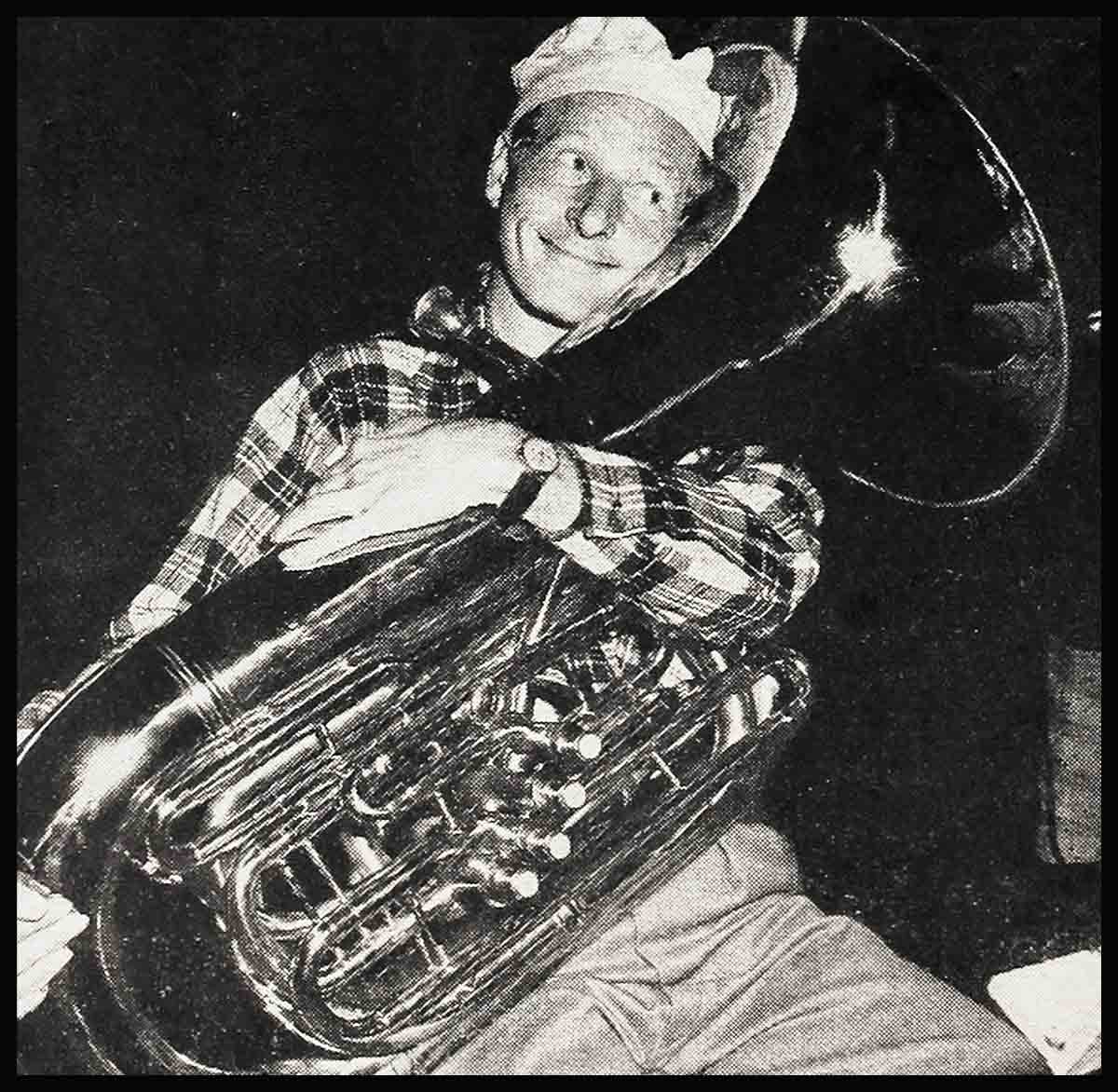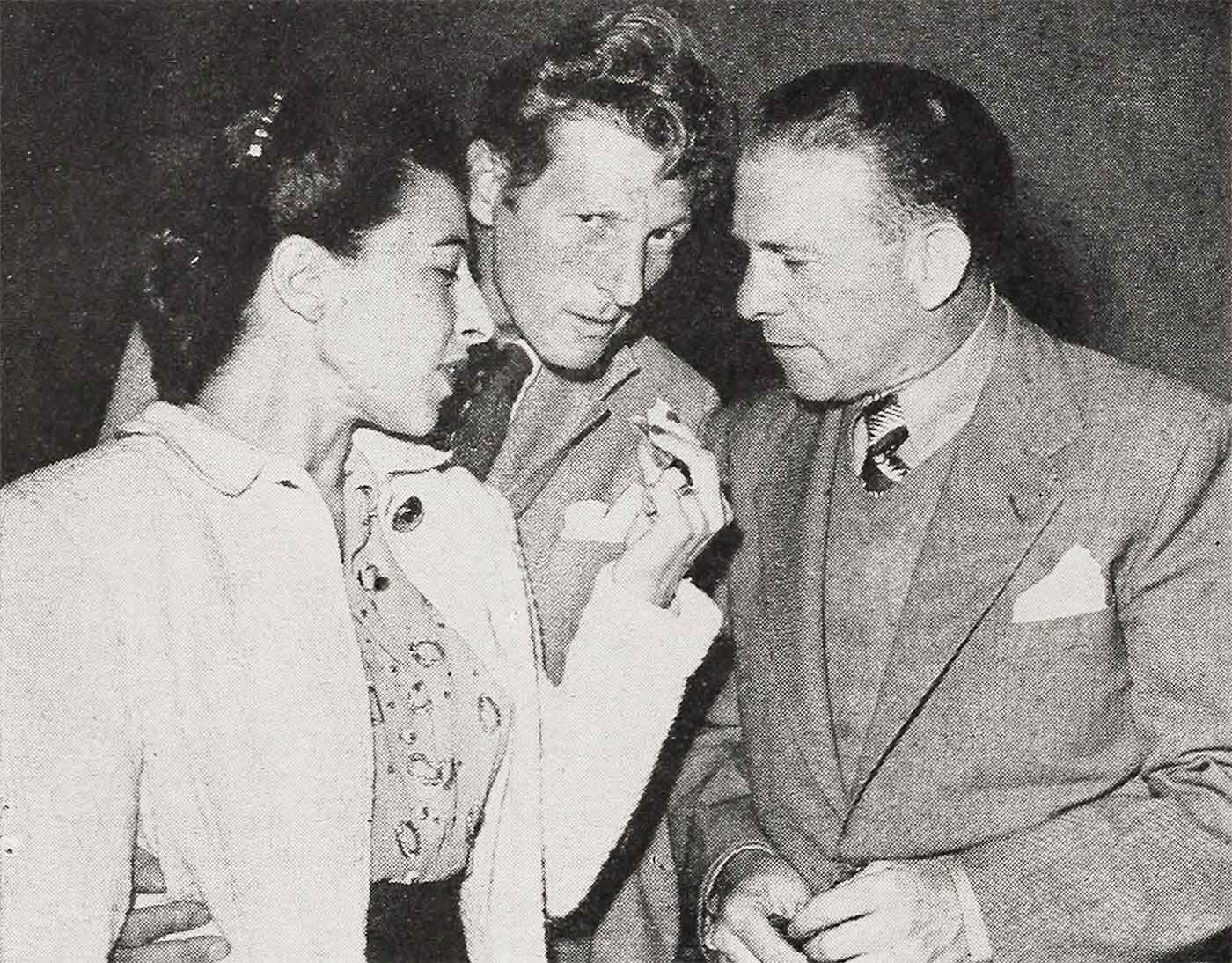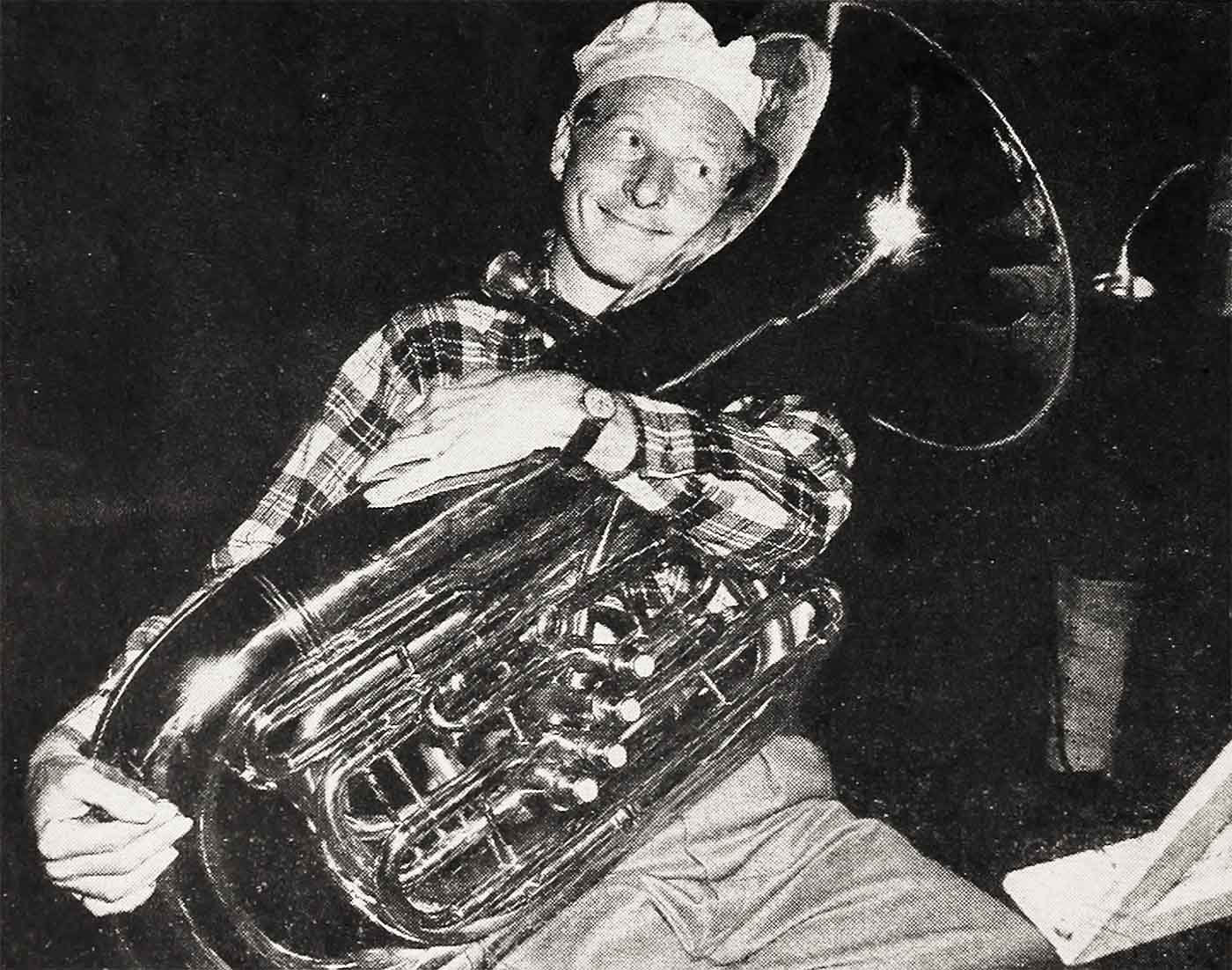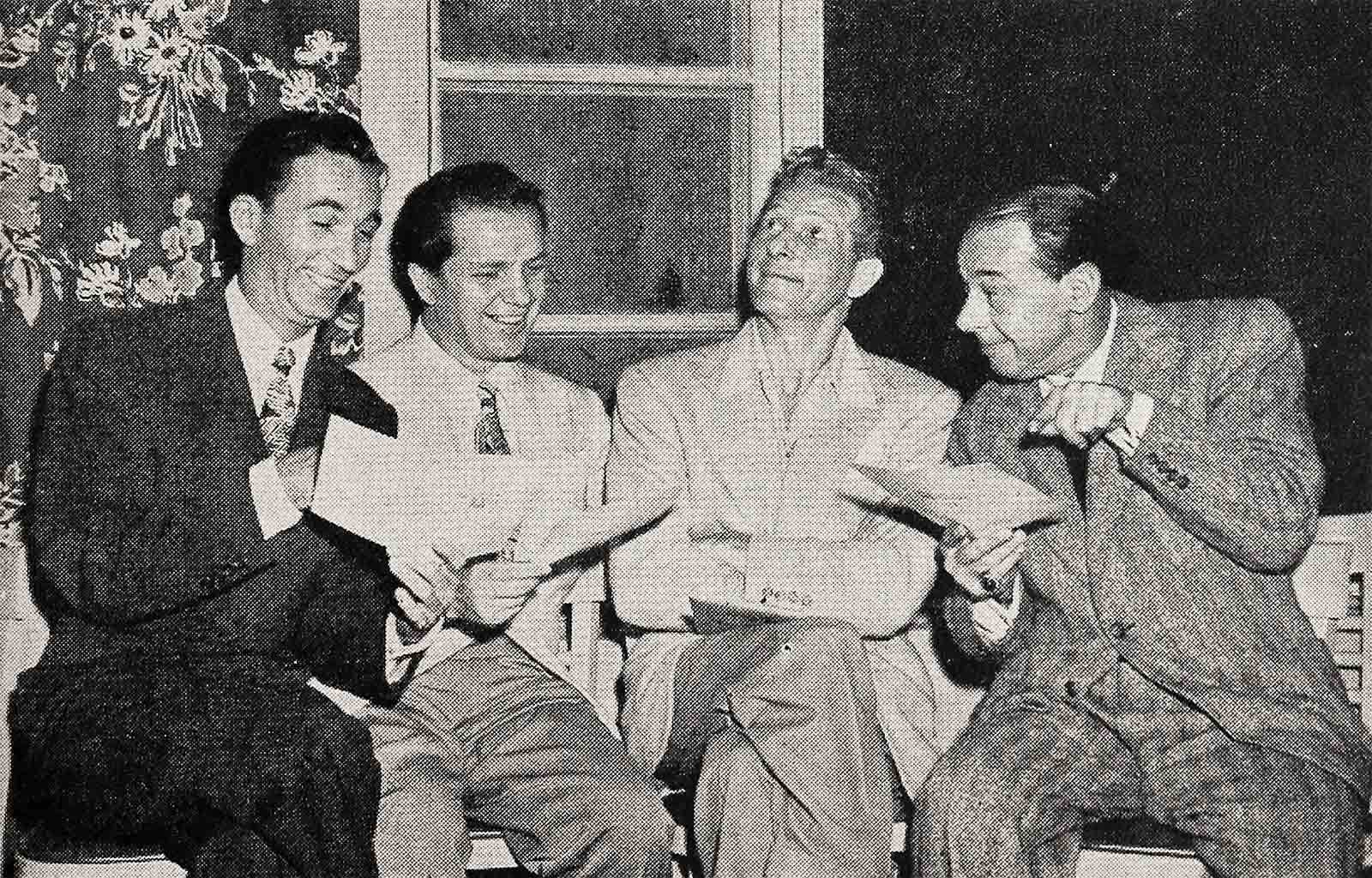
Crossroads—Danny Kaye
As this is written, the mystery of what goes on between Danny Kaye, the screen and radio comedian, and his talented wife, Sylvia Fine, appears to be hitting a new high.
Whereas only a couple of weeks ago, it looked as if all were over between them for good, with Danny sulking in a hotel, and Sylvia blithely minding her own business, they’re now being seen together in the swank night spots of Beverly Hills and the Strip. So unpredictable are the vagaries of love in Hollywood that it would take a more reckless person than I am to say what may happen next.
The whole town (and Kaye’s pals especially) cocks a questioning eye at lovely Eve Arden. But Eve continues to go about escorted by various personable young men, totally oblivious, apparently, to the fact that she is the storm center of the Kaye marital tornado.
It’s becoming a habit in Hollywood for wedded pairs to have their spats, live apart, but continue to have dates with each other. They try so hard, it seems, to hold on to wedded happiness, even when love seems to have flown out the window.
Sometimes it works, too, as in the case of Cornel Wilde and Patricia Knight, who sailed off together for Honolulu and a new honeymoon after a trial separation during which they had a lot of dates together. June Haver and Jimmy Zito tried the same thing, but the results weren’t so happy with them, since June finally filed for divorce.
Danny and Sylvia are making a desperate effort to see eye to eye, and get their matrimonial bark back on an even keel. I saw them just the other night at Romanoff’s, dining together, toasting one another in champagne, and having a lot of laughs, in very evident enjoyment.

But when the evening was over, Sylvia went back to the family mansion alone, and Danny retired to the solitude of his hotel room.
The only utterance he has made is this: “We’re just having a trial separation, and doing our best to adjust our differences without a final and permanent break.”
Everyone knows Danny’s fanatical devotion to baby Dena, and maybe this will be the tie that holds them together.
Sylvia says nothing at all, but goes rather bleakly about the business of bossing production on Danny’s next picture. This is to be the first under his new contract at Warner Brothers and, as has always been the case, Sylvia has a lot to say about the conditions under which he will work. She moved into very flossy new quarters at the studio in mid-September, and plunged into the vast mass of detail with her customary practiced skill. But not a word from her for publication to anybody.
She has maintained throughout her ordeal a calm and dignity which must be described as admirable, and if her heart is sad, she betrays no sign. At night, she leaves her round of tasks to go home and be a mother to Dena.
One fact seems to stand out in the current strained situation, and that is that the old-time gay companionship of Danny and Sylvia that marked the days before he struck pay dirt as a Samuel Goldwyn star is no more.
Some of their closest mutual friends have assured me that they were seeing too much of each other, both at work and at home. Sylvia was omnipresent in every phase of Danny’s life, and hers was the decisive voice in every question that arose affecting his career.

At times, she was almost shrewish with the press and with the crews working on his films. He sometimes reflected her mood, and got the reputation of being hard to work with. For no apparent reason, he would duck interviews set up for him with important columnists. Goldwyn’s publicity experts tore their hair over the problem of maintaining favorable public relations for their star who can exert such irresistible charm when he wants to turn it on.
Then, all of a sudden, everything changed. Danny welcomed the press, he had a fund of funny jokes to tell, and he never seemed depressed. This new mood came to be noticed first during the making of The Kid From Brooklyn, in which blonde, sophisticated Eve Arden had an important role.
Soon persons close to the picture were talking. Danny and Eve had such a lot to tell each other that they wouldn’t find time between scenes, so they took to going out together evenings. This left Sylvia very much to herself, and naturally, she didn’t like it. What wife and mother would? Buzz, buzz, buzz went Hollywood’s gossip-mongers.
Eve went quietly about shedding her mate, Ned Bergen, agent, via Las Vegas. The buzzing shot up in tempo. Some of this gossip must have reached the ears of Sylvia, because she made some very sharp and pointed remarks to Danny, which resulted in his moving out. The separation was announced with due formality and reserve, but there was pointedly no mention of an impending divorce.
I cannot remember during a long term of observation of the Hollywood scene any other wife who has been so inextricably identified with her husband’s career and success as Sylvia.

She’s an exacting task-mistress, and she’s driven herself at top speed. At the studio, long hours every day, she was in on every conference involving stories, songs, publicity, and every angle of production. Her say-so carried heavy weight.
The first break in this rule came with the making of A Song Is Born, Danny’s current and final starring picture for Goldwyn. Sylvia’s absence at the start of this picture was so conspicuous that it started tongues wagging anew. When she did go to the studio, she stayed away from the sound stages where her husband was working. The long consultations and conversations between husband and wife were no more.
Sometimes Danny betrayed uncertainty in how to play a scene, or put over a bit of business before the camera. He seemed conscious that something was missing, because he was accustomed to the presence of a friendly critic to point out his mistakes and give him a hand when his work was wonderful.
Could it be that Sylvia, one of the smartest gals in the business, was playing a smart game in staying away, and letting Danny do the best he could on his own?
You can’t help recalling an almost parallel case. That of Red Skelton and his ex-wife, Edna, now Mrs. Frank Borzage. Junior, as Edna calls Red, took another wife, but Edna still manages him. He lets her decide what’s best for him, and i its an arrangement that seems to work.
The question Hollywood is asking now is: will Sylvia Fine take a leaf out of Edna’s book, and will she be content to assume the role of guide and friend, while abdicating that of wife and sweetheart? Or is that the way Danny wants things to be?
No matter what happens, it’s certain Sylvia will figure very importantly in his life at least for the next seven years, the term of the Warner contract that establishes her as associate producer on all his pictures. Sylvia has a great deal of quiet pride. There will be no plush carpet laid out for Danny unless and until he definitely makes up his mind that Sylvia is the only girl in his life.
A baby, and especially a baby like little Dena, whom Danny loves to rave about, can make a lot of difference in the life of a sentimental gentleman of comedy.
And one wonders if perhaps there may have been a note of prophetic irony in the song that Danny warbled tenderly to Eve Arden when they were appearing together in Let’s Face It on Broadway, in 1943. The title of the song was “Let’s, Not Talk About Love.”
THE END
—BY FLORABEL MUIR
It is a quote. MODERN SCREEN MAGAZINE DECEMBER 1947




